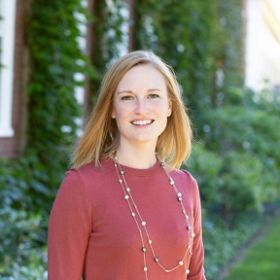Stephanie Wu
MBA 2017
MBA 2017
“The problem of climate change is not just related to clean energy, solar, wind, and batteries...There are many components that we need smart people working on, right now.”
At Optimus Ride, where Stephanie Wu (MBA 2017) is head of product, the core philosophy is simple: Self-driving electric vehicles should be an attainable, accessible good—and if they’re shared, the need for personal vehicles will be reduced overall. Based in Boston, Optimus uses scalable sensors, hardware, and algorithms to create highly efficient vehicles for defined environments, such as campuses and mixed-use developments. “It’s easier for us to understand these spaces,” says Wu, adding that these locations typically have lighter traffic and lower speed limits as well: “All of these factors help simplify the challenge of self-driving vehicles so that we can get to market faster.”
Wu studied material science and engineering at Cornell, and worked at Corning after graduation. As she developed new products, she began to think about the business angle—how did it fit into the company’s product line? How could it find the best market? That curiosity, coupled with a longstanding interest in the clean energy space, prompted her application to HBS. “Addressing climate change is one of the biggest, if not the biggest problem facing my generation,” says Wu. “One of the reasons I applied to Harvard is that its mission is ‘educating leaders who make a difference in the world.’ From that perspective, I felt that an MBA would provide the tools to ensure that whatever small piece I can contribute will make the world a better, or at least an equivalent, place for future generations to live.”
At HBS, Wu participated in gatherings, treks, and mentorship opportunities organized by the Energy and Environment Club. “Many of the people I connected with through those activities are the same people I reach out to today, professionally,” she says. In the classroom, the course Sustainable Cities and Resilient Infrastructure connected the big-picture concepts of financing and development with the need for sustainability—a link with particular resonance for Wu’s current work at Optimus. She also cites the impact of Innovating in Energy, which focuses on the particular demands of being an entrepreneur in the sector: “That course helped refine my personal thesis around why energy startups are hard, and helped me be better prepared to tackle those challenges.”
Before coming to Optimus, Wu served as director of business development at 24M Technologies, a manufacturer of semisolid lithium ion batteries. In the future, she hopes to lead a sustainable technology company, drawing on her engineering background, MBA skills, and on-the-ground experience with building teams, determining customer needs, and developing strategies. While it’s too early to say what that company will look like, it will certainly align with Wu’s personal mission to leave the world a better place to live: “The problem of climate change is not just related to clean energy, solar, wind, and batteries,” she says. “Agriculture, sustainable building materials, and transportation are factors as well. There are many components that we need smart people working on, right now.”

